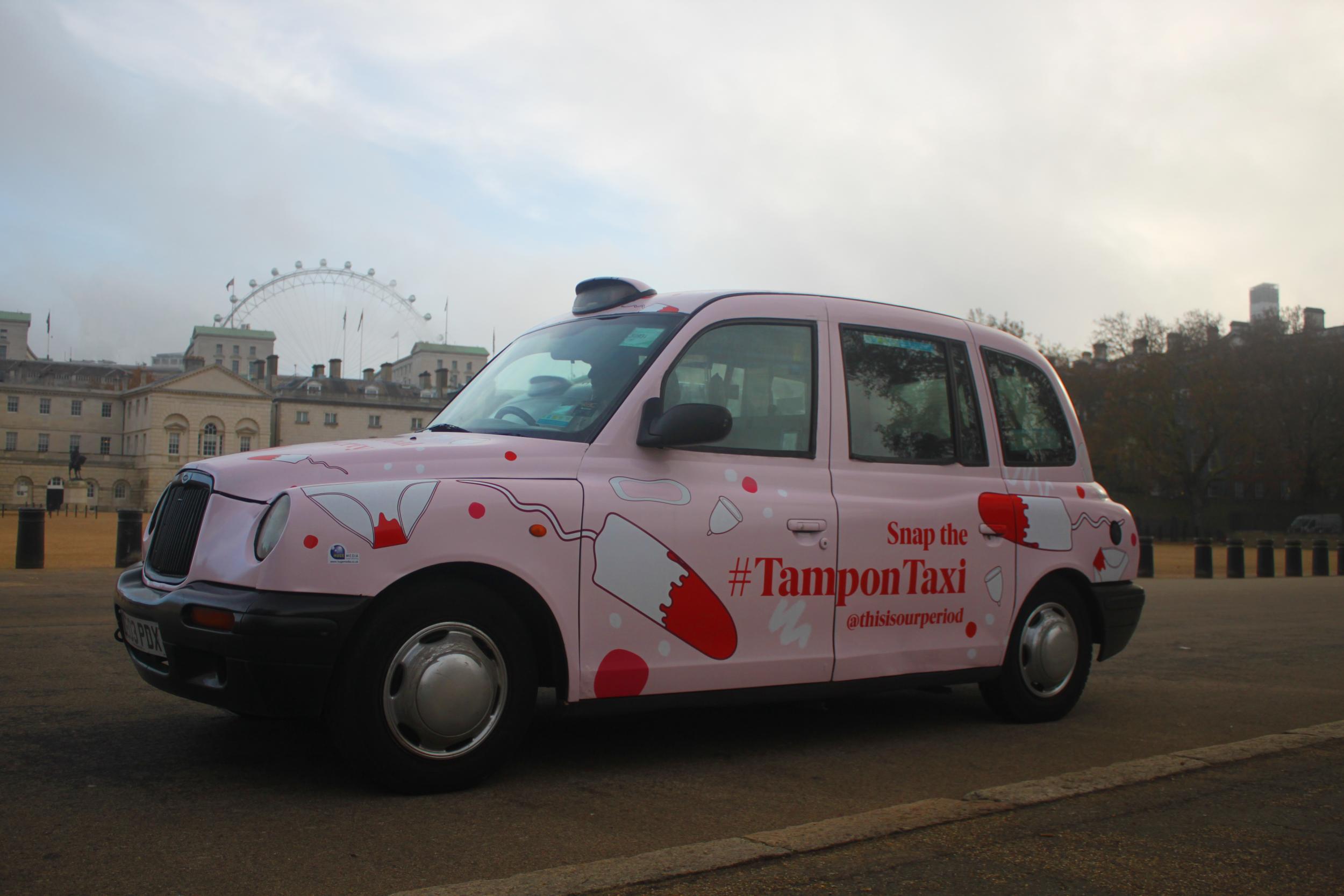Pink cab called 'tampon taxi' to distribute sanitary products to homeless women
'It is a bit of a shock tactic for some people but its working the conversation online has been pretty electric,' says campaigner

A pink cab called the “tampon taxi” is driving around London in the lead up to Christmas distributing sanitary products to women at homeless shelters.
The vehicle - which is covered in images of tampons, sanitary pads, mooncups and bloody knickers - will also be operating as a normal cab in order to raise awareness about period poverty and eradicate the stigma and taboo linked to periods.
The black cab, which will be in the capital until 19 December, will hand out a total of 5,000 sanitary products to women at shelters.
Holly Bantleman, the campaign director of period poverty campaigning group Project Period who came up with the idea for the cab, said the vehicle had already succeeded in engaging the public.
“I was sitting at an outside bar in London earlier this year, having a margarita, and a pink taxi covered in bows went past,” she said. “I'd just seen some illustrations of sanitary pads from one of our team, and thought that a taxi covered in period products would surely get people talking about global period poverty."
She added: “It is a great way to get the public engaged in an issue that they may not know about. It is a bit of a shock tactic for some people, but its working, the conversation online has been pretty electric.”
One Twitter user claimed the reaction to the cab by a lot of taxi driver “proves just why it exists” – saying there had been a great deal of misogyny and ignorance.
Addressing the criticism, she said the campaigners had always thought the reaction to the cab would be mixed but any attention was positive because it shone a spotlight on the issue.
“Whether that reaction be positive or negative, it means we’re having the conversation, and for us, that is the first step in ending period poverty for everyone, everywhere,” she said. “The more we can talk, the more action will be put into place, the more we can push for progressive policy on periods, and the more people that will not need to experience the impact of not having access to period products.”
Ms Bantleman said she was “proud” to have two men driving the taxis around London – saying they were as much behind the cause as the campaigners were.
“Jim [a black cabbie] has been amazing, he said ‘I don’t mind driving the taxi. I’ve got a daughter and a wife. I understand’,” she said.
Period poverty is a prevalent problem in Britain – the issue affects one in 10 people and has risen alongside the swelling number of those who are reliant on food banks.
Ken Loach’s award-winning 2016 film I, Daniel Blake, which includes a scene where the impoverished female protagonist shoplifts tampons, has raised awareness about the affordability of sanitary products.
Sanitary products in the UK are classed as a “luxury, non-essential item” and taxed at 5 per cent – with the average lifetime cost of sanitary products estimated at £4,800.
“Periods are often stigmatised, neglected and invisible. These behaviours reinforce discrimination and inequality and have an impact on the lives of many girls, women and trans men, particularly related to their health and development,” Ms Bantleman said.
“A lack of access to period products can play out in a range of ways, from having damaging effects on a person’s confidence and ability to socialise, to resulting in less time spent in school gaining education, to being unable to work. It can also have serious consequences for a person's health, especially when rude materials are used in replacement, such as rags and leaves.”
She said we were living in an era when people were more confident about talking about "the fact that they bleed every month” but people need to acknowledge that there are many places across the world where having your period is still greatly stigmatised.
Gabby Edlin, chief executive and founder of the charitable project Bloody Good Period, said: “I think the tampon taxi is a lovely way of normalising periods on the streets of London. Lord knows we need more people to be desensitised to menstrual blood, especially in a culture where violence inflicted blood is the norm in the media.”
Earlier this year, research found women who have experienced period poverty are more likely to suffer from anxiety or depression, struggle to pay their bills and have an unfulfilling love life.
A survey of 1,000 women, 500 of whom had suffered from period poverty, revealed a lack of access to sanitary products can have a far-reaching effect on young women’s lives.
Nearly two-thirds admitted they lack confidence because of bullies at school, while 39 per cent now experience anxiety or depression. The same amount said that they do not have many friends and find it difficult to socialise. The poll also found those who struggled to afford sanitary products are less likely to have completed their GCSEs or go on to sit A-levels.
Polling company YouGov recently found almost half of British girls have witnessed their peers being bullied and shamed about their period. The study found nearly half (43 per cent) of girls in Britain said boys tease or joke about periods – with 40 per cent of this teasing taking place in lessons under the noses of teachers.
It also found 91 per cent of girls worried about going to school while on their period and 35,000 girls are missing school because they are on their period – the equivalent to 2.1 million hours of education.
Join our commenting forum
Join thought-provoking conversations, follow other Independent readers and see their replies
Comments
Bookmark popover
Removed from bookmarks